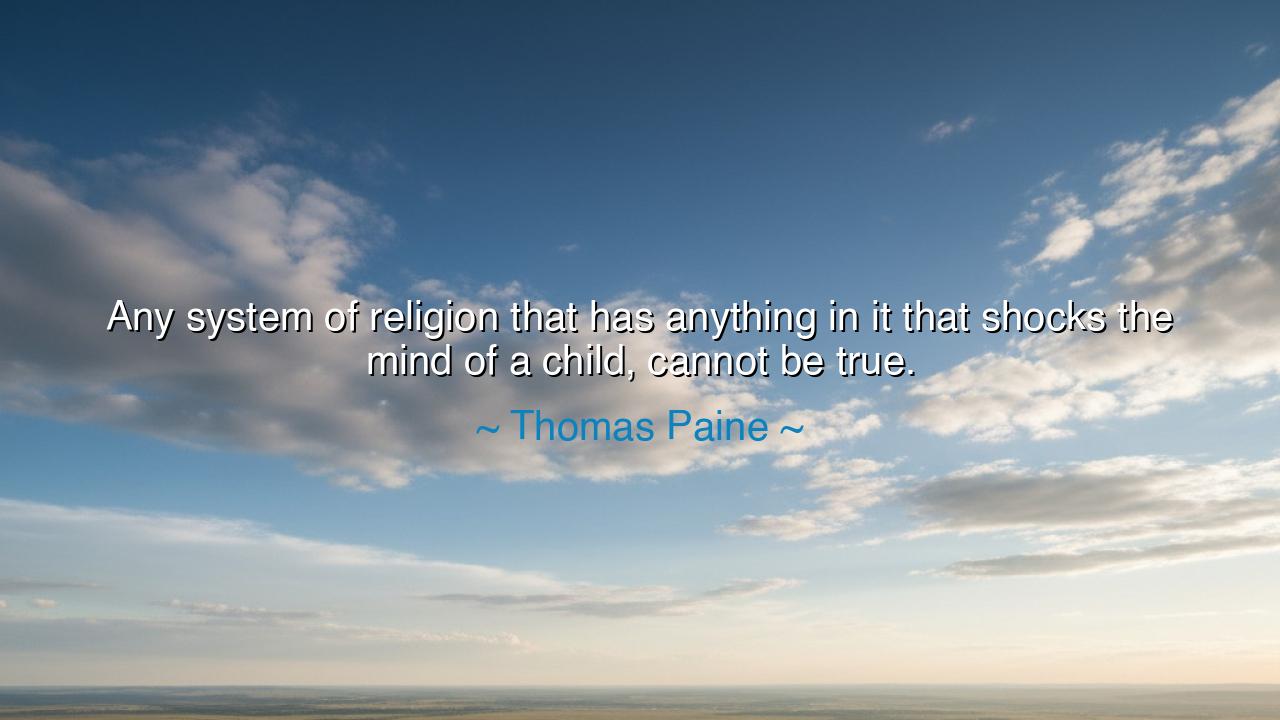
Any system of religion that has anything in it that shocks the
Any system of religion that has anything in it that shocks the mind of a child, cannot be true.






"Any system of religion that has anything in it that shocks the mind of a child, cannot be true." – Thomas Paine.
In this powerful statement, Thomas Paine challenges us to reconsider the nature of religion and its teachings. He posits that true religion, one that is rooted in truth, should not contain concepts or doctrines that are so disturbing or difficult that they might shock the innocence of a child. Paine believed that truth—whether spiritual or intellectual—should be simple, pure, and accessible to all, especially the young, whose minds are still open and untainted by the complexities and contradictions that often accompany rigid religious systems. His argument is a call to examine religion not through the lens of dogma and authority, but through the lens of humanity, simplicity, and moral clarity.
The ancients were deeply concerned with the simplicity and clarity of truth in their spiritual and philosophical teachings. Socrates, the great Greek philosopher, believed that wisdom was found not in complex arguments or pretentious dogma, but in the simple truths that all people could grasp. For Socrates, the quest for truth was an ongoing dialogue that aimed to reveal moral clarity and personal responsibility. He taught that the simplest truths were often the most profound, and that anyone, even a child, could come to understand them through careful thought and reflection. In this sense, Paine’s view of religion aligns with the ancient Greek idea that truth, to be meaningful, must be clear and accessible to all people, especially those who approach the world with innocence and an open heart.
In the Christian tradition, we find a similar emphasis on simplicity and innocence. Jesus Christ often spoke in parables, using simple and understandable language to convey profound truths. His teachings were designed not to shock or confuse, but to illuminate the moral path for all, including children. Jesus said, "Let the little children come to me, and do not hinder them, for the kingdom of heaven belongs to such as these." His message was one of love, compassion, and humility, principles that a child could easily understand and embrace. Paine likely drew from this tradition, believing that religion should be founded on basic, universal truths that could be understood by everyone, from the most learned philosopher to the smallest child.
Consider the example of Mahatma Gandhi, whose spiritual and moral teachings were rooted in the idea of truth as something simple, powerful, and accessible to all. Gandhi’s concept of ahimsa, or non-violence, was a principle that he felt should be embraced by everyone, including children. It was not an abstract or complex idea, but a direct reflection of the innate compassion and love that every human being could feel and act upon. Gandhi’s own life was a testament to living a simple and truthful life—one that did not rely on the complexities of religious doctrine, but on the fundamentals of kindness and respect for all life. This simplicity is at the heart of Paine’s argument: if a religion is to be true, it must resonate with the innocence and moral clarity that we find in the hearts of children.
Paine’s critique of religion was not aimed at spirituality itself, but at the corruption and rigidity he saw within certain religious systems. In his time, many forms of organized religion became entangled with political power, using complex rituals, oppressive rules, and fear to maintain control over people’s minds and actions. Paine saw this as a distortion of what true religion should be—a personal connection to the divine, one that is not obscured by hierarchical structures or manipulative doctrines. The complexity and rigidity of such systems, according to Paine, were what shocked the mind of the innocent child, for they contained contradictions that were not rooted in basic human compassion or moral clarity.
The lesson from Paine’s words is one of authenticity and clarity in our spiritual practices and beliefs. Religion, or any belief system, should not be something that divides or alienates, but something that brings people together through simple, universal principles of love, justice, and compassion. If we find ourselves drawn to systems that demand blind obedience or present ideas that would confuse or frighten a child, it may be time to reconsider the very nature of those beliefs. True faith is not about complicating the divine or creating systems that elevate the few above the many. It is about connecting with the fundamentals of human experience, which transcend age, background, and intellect.
In our own lives, we must ask ourselves: Do our beliefs promote understanding, or do they foster division and confusion? Are we living in alignment with simple truths—the universal principles of love, compassion, and justice—or are we allowing ourselves to be trapped in the complexities of rigid doctrines? The true measure of any belief system is how it nurtures the human soul and encourages us to live lives that are simple, humble, and compassionate, not how it binds us in fear or confusion. Let us seek truth that is clear and accessible to all, so that we may live lives that reflect the deepest and most fundamental human values.






AAdministratorAdministrator
Welcome, honored guests. Please leave a comment, we will respond soon